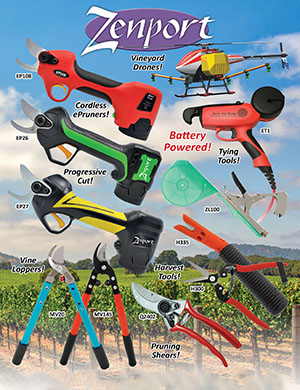Volume Discounts! Flat Rate Shipping!
- Categories
-
Agriculture and Garden Products
- Long Reach Cut-n-Hold Pruners and Fruit Pickers
- Agricultural Drones
- Bird and Squirrel Feeders
- Canopies and Umbrellas
- Digital Water Testing Meters and Counters
- Fruit Picking Bags Buckets Pails Totes
- Gardening Accessories
- Grafting Tools and Supplies
- Grape Razor Fork Vineyard Harvesting Tool
- Greenhouses
- Hedge Shears
- Holsters and Sheaths
- Knives and Sickles
- Landscape Products and Accessories
- Plant Extraction
- Plant Tying and Training
- Pruning Tools
- Scissors
-
Shears for Harvest and Thinning
- Onion Topping Topiary Sheep Shears
- Harvest and Thinning Shear Replacement Parts
- All Harvest and Thinning Shears
- Cannabis Trimming Shears
- Comfi-Grip Deluxe Grape Shears
- Curved and Straight Euro Shears
- Floral and Hoof Trimming Shears
- Forged Fuji Apple Clippers
- Forged Lemon Harvest Shears
- Heavy Duty Thinning Shears
- Light Bypass Utility Pruners
- Long Serrated Edge Grape Shears
- Long Straight Edge Grape Shears
- Microblade Trimmers and Pruners
- Precision Micro Harvest Trimmers
- Short Straight Edge Fruit Shears
- Thread and Floral Clipper with Lock
- Stem Clippers
- Sunrooms
- Replacement Parts
- Mechanical Dial Scales
- Sport Knives and Multi-Function Tools
- Pressure Gauges
- Safety Products
- Grilling Tools and Accessories
- Sharpening Tools and Files
-
Agriculture and Garden Products
- Information
- Customer Service
- General Info
- Useful Links
- Zenport Industries - Professional Horticulture Tools
- Agriculture Hardware
- Apple Clipper
- Apple Clippers
- Apple Picking Bag
- Apple Picking Bags
- Apple Picking Bucket
- Apple Picking Buckets
- Apple Shear
- Apple Shears
- Avocado Clipper
- Avocado Clippers
- Avocado Shear
- Avocado Shears
- Battery Powered Lopper
- Battery Powered Loppers
- Battery Pruner
- Battery Pruners
- Berry Picking Buckets
- Citrus Clipper
- Citrus Clippers
- Citrus Picker
- Citrus Shear
- Citrus Shears
- Cordless Pruner
- Cordless Pruners
- Download DuroKon Catalog
- Electric Lopper
- Electric Loppers
- Electric Pruning Shears
- Electric Scissors
- Electric Shears
- Farm Hardware
- Farm Hardware HW
- Farm Hardware Store
- Farm Knife
- Farm Knives
- Farm Worker Clinical Care Resource - Ground Crop Harvesting Work
- Farmer Knife
- Fruit Harvest Bags
- Fruit Picker Bag
- Fruit Picking Bag
- Fruit Picking Bags
- Fruit Picking Bucket
- Fruit Picking Buckets
- Fruit Shear
- Grape Clipper
- Grape Clippers
- Grape Hook
- Grape Knife
- Grape Shear
- Grape Shears
- Grower Tool Supply
- Harvest Knife
- Harvest Knives
- Harvest Shear
- Harvest Shears
- Harvest Sickle
- Harvesting Bag
- Harvesting Bags
- Horticulture Depot
- Horticulture Tool
- Horticulture Tools
- Lemon Clipper
- Lemon Clippers
- Lemon Shear
- Lemon Shears
- Manzana Clipper
- Manzana Clippers
- Manzana Shear
- Manzana Shears
- Microblade Pruner
- Ode To My Zenport Pruner
- Onion Shear
- Onion Shears
- Orange Clipper
- Orange Clippers
- Orange Shears
- Orchard Lopper
- Orchard Picking
- Picking Bag
- Picking Bucket
- Picking Buckets
- Pruner Store
- Ratchet Pruner
- Tapener Tool
- Telescopic Fruit Picker
- Top Grafter
- Twine Knife
- Vegetable Bags
- Vine Lopper
- Wells and Wade Fruit Picking Bag
- Wholesale Garden Tools
- Zenport Pruner
- Zenport Store
- Zenport Tools Online
- Zenport Broccoli Knife K117 Worker Health Care Topics
- Zenport Cabbage Knife K113 Worker Health Care Topics
- Zenport Cauliflower Knife K114 Worker Health Care Topics
- Zenport Harvest Knife K118 Worker Health Care Topics
- Zenport Produce Knife K116 Worker Health Care Topics
- Contact











